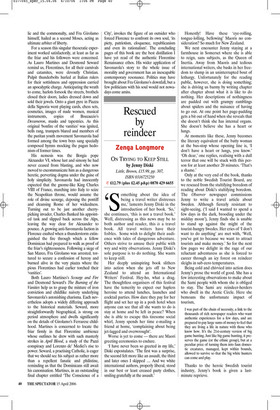Rescued by reindeer
Zenga Longmore
ON TRYING TO KEEP STILL by Jenny Diski Little, Brown, £15.99, pp. 307, ISBN 0316725250 ✆ £12.79 (plus £2.45 p&p) 0870 429 6655 ‘Something about the idea of being a travel writer distresses me,’ laments Jenny Diski in the introduction of her book. ‘So,’ she continues, ‘this is not a travel book.’ Well, distressing as this news may be to both author and reader, this is a travel book. All travel writers have their foibles. Some wish to delight their audience with tales of dangerous adventure. Others strive to amuse their public with wry and witty observations. Jenny Diski’s sole purpose is to do nothing. She wants to keep still.
Her deeply uninspiring book slithers into action when she jets off to New Zealand to attend an International Writers’ Festival. Hey-ho, what a drag. The thoughtless organisers of this festival have the temerity to expect our hapless heroine to attend lunches, launches and cocktail parties. How dare they pay for her flight and set her up in a posh hotel when anyone can see that all she wants to do is stay at home and be left in peace? When she is able to escape this tiresome social whirl, Jenny spends her time e-mailing a friend at home, ‘complaining about being jet-lagged and overwrought’.
Worse is yet to come — there are Maori greeting ceremonies to endure.
‘I have never been so greeted in my life,’ Diski expostulates. ‘The first was a surprise, the second felt more like an assault, the third and later ones I skipped ... And we white international authors, properly liberal, stood in our best or least creased party clothes, smiling gratefully at the assault.’ Honestly! Have these ‘eye-rolling, tongue-lolling, bellowing’ Maoris no consideration? So much for New Zealand.
We next encounter Jenny staying at a farmhouse in Somerset where she is able to reign, sans subjects, as the Queen of Inertia. Away from Maoris and tedious international writers, she basks in her freedom to slump in an uninterrupted bout of lethargy. Unfortunately for the reading public, however, she is doing something; she is driving us barmy by writing chapter after chapter about what it is like to do nothing. Her descriptions of nothingness are padded out with grumpy ramblings about spiders and the nuisance of having to go out. At one point her page-padding gets a bit out of hand when she reveals that she doesn’t think she has internal organs. She doesn’t believe she has a heart or lungs.
At moments like these, Jenny becomes the literary equivalent of the batty woman at the bus-stop whose opening line is, ‘I don’t have a heart or lungs, you know.’ ‘Oh dear,’ one replies, realising with a dull terror that one will be stuck with this person for at least another 20 minutes. ‘That’s a shame.’ Only at the very end of the book, thanks to the noble Swedish Tourist Board, are we rescued from the stultifying boredom of reading about Diski’s stultifying boredom. The Observer newspaper commissions Jenny to write a travel article about Sweden. Although fiercely resistant to sight-seeing, (‘I said I wanted to spend a few days in the dark, brooding under the midday moon’), Jenny finds she is unable to stand up against the might of the tourist-hungry Swedes. Her cries of ‘I don’t want to do anything’ are met with, ‘Well, you’ve got to because we want to attract tourists and make money.’ So for the next few pages we delight in the rage of our reluctant adventuress as she is forced to career through an icy forest on reindeer sleighs in sub-zero temperatures.
Being cold and chivvied into action does Jenny’s prose the world of good. She has a few interesting observations to make about the Sami people with whom she is obliged to stay. The Sami are reindeer-herders who dwell in the Arctic Circle. Here she bemoans the unfortunate impact of tourism,
I was part of the chain of necessity, a link to the thousands of rich newspaper readers who want authentic experiences for a few days, and are prepared to pay large sums of money to feel that they are living a life in nature with those who know how. It’s the 21st-century version of big game hunting. Just like big game hunting, it preserves the game (or the ethnic group), but at a peculiar price of turning them into faux domestic creatures, managed, kept within bounds, allowed to survive so that the big white hunters can come and play.
Thanks to the heroic Swedish tourist industry, Jenny’s book is given a lastminute reprieve.















































 Previous page
Previous page